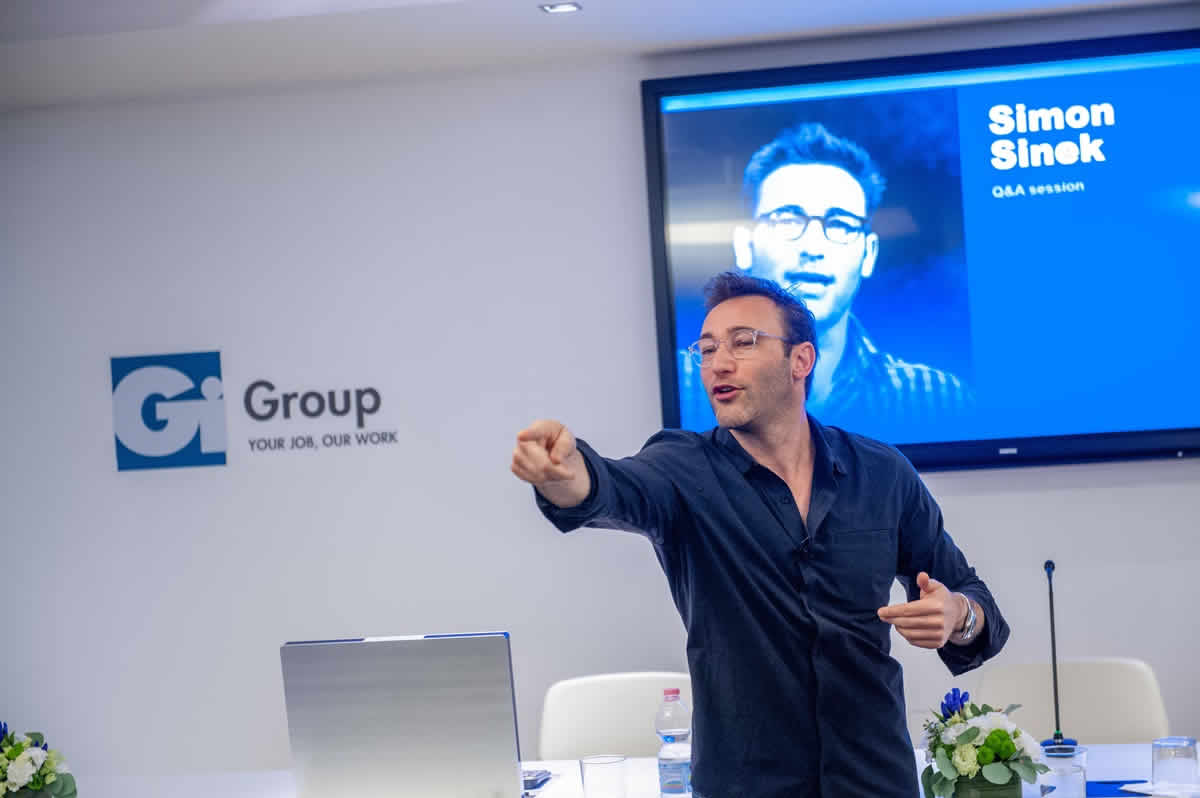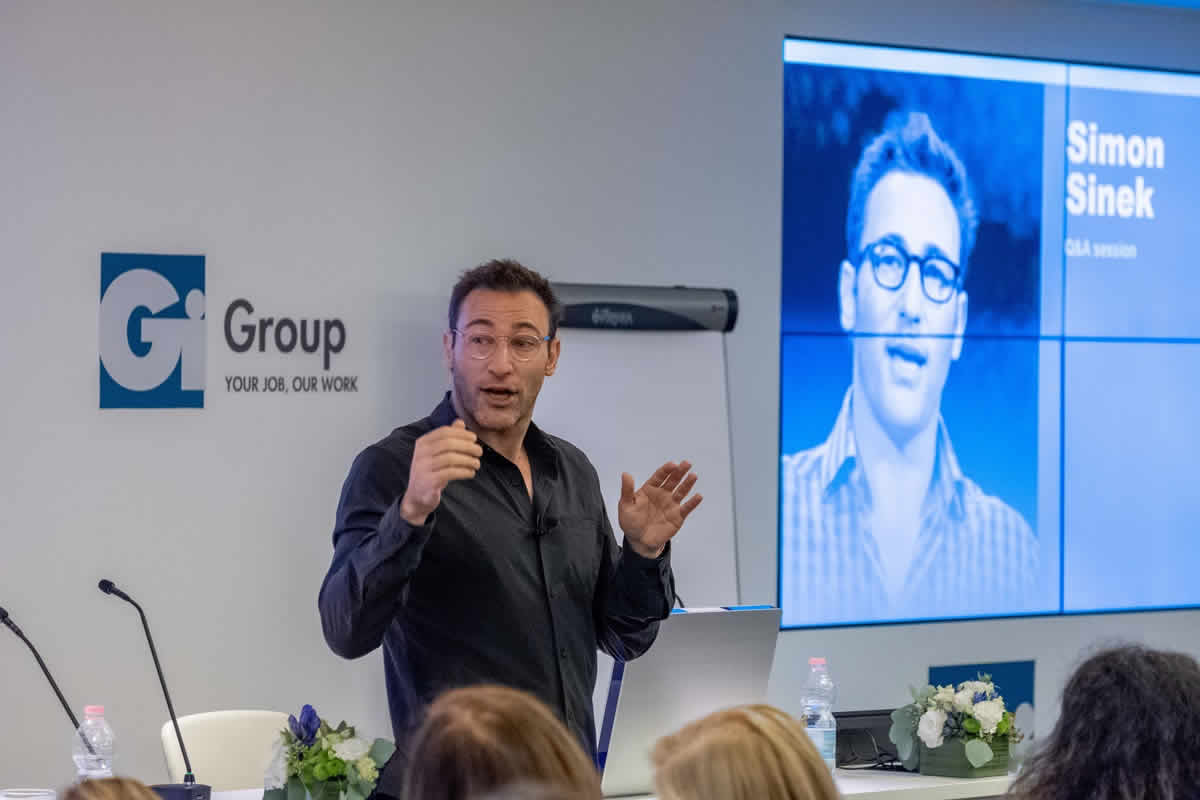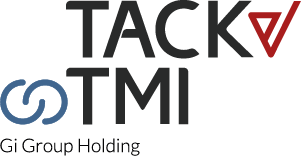Simon Sinek on Leadership
5 leadership lessons we learned from Simon Sinek: a private keynote
Simon Sinek doesn’t really need introductions. He is the author of multiple best-selling books including Start With Why (global best seller) and Leaders Eat Last (New York Times and Wall Street Journal best seller), and his first TED Talk in 2009 rose to become the third most watched talk of all time on TED.com, with over 46 million views.
Tack TMI had the honour to welcome Mr. Sinek at Gi Group office in Milan for a private keynote in conjunction to his participation at the World Business Forum: the event, moderated by Tack TMI CEO Jim O’Brien, focussed on topics near and dear to our hearts, such as how we can build sustainable work environments, the importance for leaders to have a clear vision and how training your employees is essential to allow them to reach their full potential and make sure they feel comfortable and safe at work.
We felt privileged to have the chance to listen to this visionary thinker and hear him answering questions from the audience: so here are 5 lessons we learned from him.
1) Don’t focus on being number 1
Business doesn’t work like football or chess: there are no known players, fixed rules or clear endpoint. So why do companies often strive to become the “number 1”? Because they play with a finite mindset instead of an infinite one. Leaders should be focussing on building business that lasts forever, or at least, well beyond them. How can leaders embrace an infinite mindset, then? By starting from their people, it’s as simple as that. Leaders who want their business to be truly successful, always need to put the human being at the centre. This is the only way to get trusting teams in which people come to work and feel safe to admit mistakes or ask for help. When the company puts the spreadsheet first, then the relationship with employees will be transactional.

2) Act, don’t react
Companies with a finite mindset react to what their competitors are doing in order to be the number 1 in their field. They engage in a never-ending race with their “rivals”, whilst forgetting their true WHY. There are multiple examples of companies that adopted this short-sighted approach and lost their vision, trying to find the “next big thing”: Boeing vs. Airbus, Starbuck vs. Costa, Dell vs. Apple. The only way to build sustainable business is to find a clear vision, keep acting on it and respect human beings working for you.
3) Train your people
A salesperson doesn’t necessarily become a sales manager from one day to the other. We need to support people in moving seamlessly through organisations by training them on fundamental skills such as empathy, confrontation, how to deliver feedback, how to lead… if an organisation wants its people to be loyal, it has to put them first and nurture them so that they can become the best version of themselves. How training is delivered also plays a fundamental role: 1-day trainings are surely better than nothing at all, but long lasting results take time. We need human skills today more than ever, particularly when we think about young people who have never experienced a world without laptops and mobile phones. And these skills need to be continually nurtured.
4) Happiness and Joy are two different things
Organisations and employees often mix happiness and joy: happiness is fleeting, it comes and goes and the idea that we all need to love our job everyday can bring a lot of frustration. We should all focus on being fulfilled and find joy in what we do. How can we reach that point in our life and our career? First thing we need to do is to help each other out and connect as human beings. How many times have we sent an email, instead of walking down to our colleague’s desk? How many times have we been distracted by our phone or by an email during a business meeting? We are all guilty of that, we need to go back to basics and stop staring at a screen for the whole day at work.
Leaders need to set the example here: roam the room, say hello to people you meet, ask how they’re doing. Running a survey will never lead to the same result!

5) Your WHY is fixed, VISION is more fluid
We all only have one WHY in our life: that is the one thing in which we feel more passionate, focussed, competent. Once we find it we can discover new and better ways to articulate it, but we can’t change it. VISION, on the other hand, is a dynamic concept that requires constant honing and refining. Great leaders have a vision of the future that does not yet exist, and an ability to communicate that vision and act on it. A true leader puts words to the world he or she imagines and inspires others to join in creating a brighter future. Sharing someone else’s vision can be incredibly fulfilling: when we find the right leader, we will be naturally encouraged to help bring that vision to life. And a true leader is one that helps people feel inspired, safe and valued every single day.
Thinking about embarking on a leadership journey? Talk to Tack TMI, we can help!
